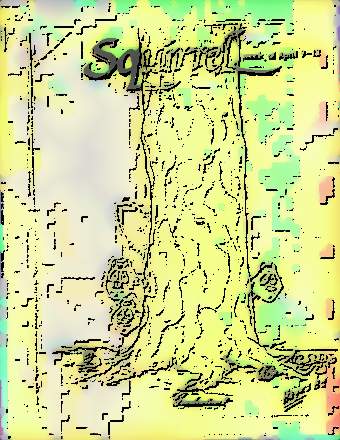|
On MESsy Relationships and Other Paradoxes
In the last issue of The Squirrel, Ann Joyner, Barry Stern and Mary Shales raised some interesting points on disciplinary and interdisciplinary work in the Faculty and the tendency for some students to stereotype others as planners or managers. As one of those students who admittedly had demonstrated this tendency in the past and I would like to use this opportunity to both reflect on my studies in FES and explain why I feel planners must be aware of the paradigm that underlies the ideology of domination and control. When I first entered FES, Bev Reynolds warned me that the institution tended to generate changes in intimate personal relationships . Citing the record of students, staff and faculty, she observed: "Those who come married leave divorced; those who come single, leave married." This summary of the interpersonal history of the Faculty may be somewhat simplistic but it does embody more than a grain of truth in my experience. In support of the claim Bev may indeed parade my case one day; I came married and I fully expect, barring an unpredicted arrow from Cupid, to leave divorced. Moreover, I am not alone in this experience as many of you well know. Some of the reasons which may explain why this happens may include the stress of degree work, financial problems, the length of the degree, new friendships between individuals with common interests, the psychological insecurity that many students experience during general exam "trials", etc. I do not think it is possible to offer a formula however. I just think that FES tends to create all sorts of new, "Messy" relationships between students and faculty. I relate the above primarily because I think that metaphorically it summarizes the essence of a stimulating program in FES. Messy relationships in plans of study, exams, discussions, informal meetings, workshops and field experience placements. Clearly I would not advocate that students and faculty deliberately destroy their secure interpersonal relationships and start new ones. However I do feel strongly that this graduate program allows exploration of difficult intellectual problems that require one to dabble in what I like to phrase "the paradoxes of agriculturalism." These paradoxes have generated ideas about the relationship between human and nature, technology and culture, planning and determinism that are multifaceted and "messy." To argue otherwise, in my view, is to deny that the problems facing modern civilization require a radical reorientation along the lines described by Ophuls in Ecology and the Politics of Scarcity. Moreover, it is to avoid the unavoidable connections between environmental, economic, and political issues.
As opposed to deep ecology, Bill Devall suggests that planners and other interventionists practice shallow ecology. This kind of simplification seems reductionist and irritates many planners who dislike being labeled. They exaggerate, of course, in their assertion that the simplification is akin to the Cartesian split between mind and body, but it is arbitrary and even absurd. We all engage in some types of planning to organize our daily lives. Moreover, there is more commonality in the work of Professors Lang and Livingston than they probably would publicly admit. The paradox is that planning and ecophilosophy students engage in hurried debates as if planning, politics or economics and philosophy are interdependent aspects of different problems. They are, however, inevitably interrelated. The difficulty of the course is that the relationships between shallow and deep ecology, between technology and social change, etc. are messy. It is very easy to avoid them altogether and slip into the bland homogenization of modern society. It is still easier to adopt a dogma on doctrine as the basis of one's analysis -- whether rational, comprehensive planning and critical theory -- and abandon the critical edge of innovative graduate work entirely. But this would not qualify as an interdisciplinary inquiry into alternatives even if it did allow one to avoid messy relationships and problems in pursuit of one's degree. Having stated my feelings about deep ecology and planning, I would now briefly like to comment on FES as a learning environment. It has taken me quite a few terms to recognize the uniqueness of FES as an "educational institution." I feel that if I graduate I will not leave jaded; my experience has been rich and full. I believe that other students can share this through participation such as sports, ESSA, Faculty Council and cooperative research. Alan Greenbaum recently remarked to me that he learned as much from other students at FES as he did from the faculty. I believe that this observation would please Prof. Gerry Carrothers; that this was the intention of the faculty all along. Unfortunately, some of the magic seems to have left FES over the past decade. It has not entirely evaporated however. I fully expect that FES will continue to produce innovative thinkers, researchers, planners. New faculty members next Fall can only aid this process in the long run and I am pleased to have an opportunity to contribute to the process of selection now underway.
From The Squirrel, Newsletter of the FES Students, York University, April, 1984. |

